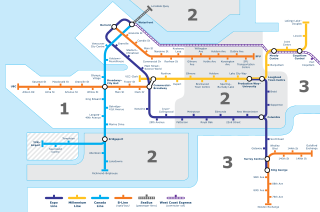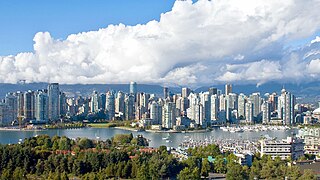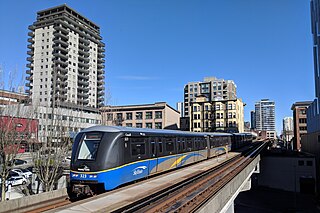Related Research Articles

Granville Island is a peninsula and shopping district in the Fairview neighbourhood of Vancouver, British Columbia, Canada, across False Creek from Downtown Vancouver, under the south end of the Granville Street Bridge. Formerly an industrial manufacturing area, it was named after Granville Leveson-Gower, 2nd Earl Granville.

Filipino Canadians are Canadians of Filipino descent. Filipino Canadians are the fourth largest subgroup of the overseas Filipinos and one of the fastest-growing groups in Canada.

The Canadian Junior Football League (CJFL) is a national Major Junior Canadian football league consisting of 19 teams playing in five provinces across Canada. The teams compete annually for the Canadian Bowl. Many CJFL players move on to professional football careers in the Canadian Football League (CFL) and elsewhere.

The Vancouver Downtown Historic Railway was a heritage electric railway line that operated from 1998 to 2011 between Granville Island and Science World, in Vancouver, British Columbia, Canada. It operated only on weekends and holidays, usually from May to mid-October, and was aimed primarily at tourists. Two restored interurban trams were used on the line, which used a former freight railway right-of-way.

Ellen Woodsworth is an international speaker and activist based in Vancouver, British Columbia, Canada. She is the founder and matriarch of Women Transforming Cities International Society and the Co-Chair of WILPF, Canada.
H. Peter Oberlander, was a Canadian architect and Canada's first professor of Urban and Regional Planning.

Transportation in Vancouver, British Columbia, has many of the features of modern cities worldwide. Unlike many large metropolises, Vancouver has no freeways into or through the downtown area. A proposed freeway through the downtown was rejected in the 1960s by a coalition of citizens, community leaders and planners. This event "signalled the emergence of a new concept of the urban landscape" and has been a consistent element of the city's planning ever since.
Walter Hardwick was an academic and community leader whose work shaped the city and region of Vancouver. Professor Emeritus Hardwick was involved in public life in British Columbia at the civic, regional, provincial, national and international levels. His longest service to the Province was through his teaching and scholarship; he taught in the Department of Geography at the University of British Columbia (UBC) for over thirty years. He is the father of former Vancouver City Councillor Colleen Hardwick.
The EcoDensity Initiative was officially launched in 2006 in Vancouver, British Columbia, Canada, in conjunction with the World Urban Forum. The initiative was a response to deconcentration of urban land use due to urban sprawl. The initiative used density, design and land use as catalysts towards livability, affordability and environmental sustainability. The program aimed to reduce car reliance, deliver more efficient urban land use, improve green energy systems and build a resilient and adaptable community. In high-density urban areas, utilizing the existing infrastructure and transit and community amenities tends to lead towards a more sustainable and livable state. Accordingly, EcoDensity was designed to strategically enhance densification with the primary aim of efficiently structured neighbourhoods, denser urban-patterns and increased affordable housing.
Don W. Vaughan L.L.D. is an American landscape architect based in Vancouver, British Columbia, Canada.

Vancouverism is an urban planning and architectural phenomenon in Vancouver, British Columbia, Canada. It is characterized by a large residential population living in the city centre with mixed-use developments, typically with a medium-height, commercial base and narrow, high-rise residential towers, significant reliance on mass public transit, creation and maintenance of green park spaces, and preserving view corridors. The architect Bing Thom described Vancouverism this way:
It's a spirit about public space. I think Vancouverites are very, very proud that we built a city that really has a tremendous amount of space on the waterfront for people to recreate and to enjoy. At the same time, False Creek and Coal Harbour were previously industrial lands that were very polluted and desecrated. We've refreshed all of this with new development, and people have access to the water and the views. So, to me, it's this idea of having a lot people living very close together, mixing the uses. So, we have apartments on top of stores. In Surrey we have a university on top of a shopping centre. This mixing of uses reflects Vancouver in terms of our culture and how we live together.

Abu Dhabi is the capital and second-most populous city of the United Arab Emirates, after Dubai.

Metrotown is a town centre serving the southwest quadrant of Burnaby, British Columbia, Canada. It is one of the city's four officially designated town centres, as well as one of Metro Vancouver's regional town centres. It is the central business district of the City of Burnaby.

Jennifer Keesmaat is a Canadian urban planner who served as Chief City Planner of Toronto from 2012 to 2017 and the runner-up in the 2018 Toronto mayoral election to Mayor John Tory.
Complete communities is an urban and rural planning concept that aims to meet the basic needs of all residents in a community, regardless of income, culture, or political ideologies through integrated land use planning, transportation planning, and community design. While the concept is used by many communities as part of their community plan, each plan interprets what complete community means in their own way. The idea of the complete community has roots in early planning theory, beginning with The Garden City Movement, and is a component of contemporary planning methods including Smart Growth.

Urban rail transit in Canada encompasses a broad range of rail mass transit systems, including commuter rail, rapid transit, light rail, and streetcar systems.

Geoffrey Massey was a Canadian architect and urban planner noted for his modernism-inspired architectural works. He was known for his partnership with architect Arthur Erickson that produced notable designs including the Simon Fraser University, and MacMillan Bloedel Building. As an urban planner Massey was known for his contributions toward pedestrian-friendly densification of Vancouver and development of Granville Island in the city.
References
- 1 2 "This is what Brampton could look like in 2040". Toronto Star, By Fatima Syed, May 7, 2018
- ↑ "Don’t Let the City and Development Endanger Vancouver’s Mountain Views". The Tyee, Sandy James 24 Jul 2018
- ↑ "After Vancouverism: a conversation with Larry Beasley at the Gwerk Salon". Jordan Yerman, Vancouver Observer, Apr 18th, 2014
- ↑ "Walk this way: Vancouver urbanist Larry Beasley leads city tour". Vancouver Courier, Naoibh O’Connor, May 4, 2017
- ↑ "Critics say new Vancouver policy will change city skyline ‘as we know it’". Frances Bula, VANCOUVER, The Globe and Mail, February 27, 2018
- ↑ Order of Canada citation
- ↑ "Exit interview: NCC adviser Larry Beasley on surviving the Harper government". Ottawa Citizen, Don Butler, March 27, 2016
- ↑ "Larry Beasley’s Simple Plan". Vancouver Magazine, December 1, 2008
- ↑ George-Cosh, David (April 13, 2008). "The man who built Vancouver has a grand plan for Abu Dhabi". The Province. Archived from the original on November 4, 2012. Retrieved 2008-04-15.
- ↑ "Ecodesign for Cities and Suburb". Island Press. Island Press. Retrieved 22 October 2015.
- ↑ "'Stark choices' for Vancouver if housing models don't change, expert says". CBC News · Mar 21, 2017
- ↑ searching for new vision after hire of urban planner". Toronto Star, By Fatima Syed, June 26, 2017